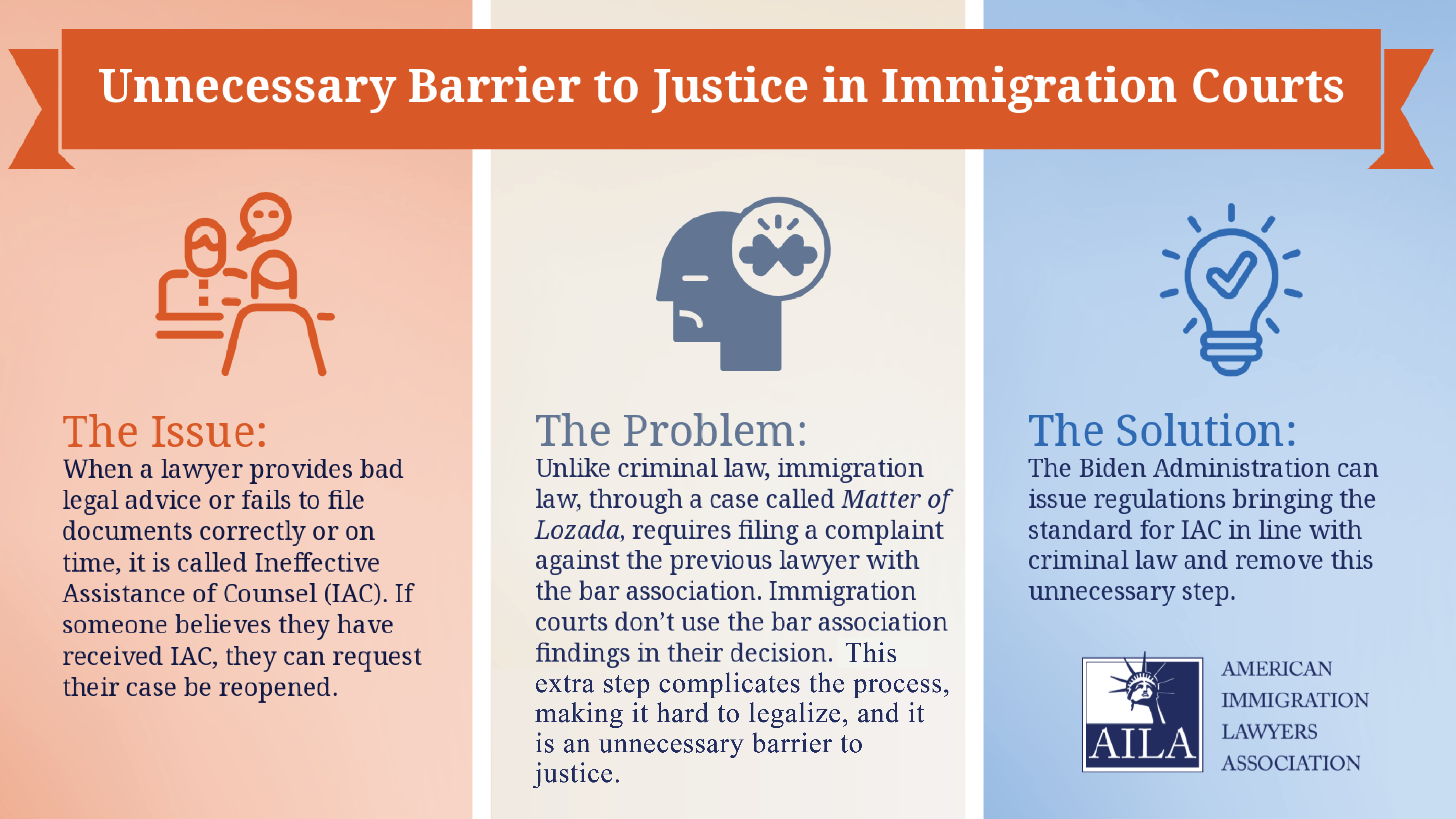Featured Issue: It's Time to Change the Lozada Standard
AILA calls upon Congress and the Biden Administration to ensure fairness when harmful errors are made by counsel in immigration court cases.
To safeguard the Constitution’s guarantee of due process, American courts will reexamine decisions if an attorney commits an error that harms their client. In 1984, the Supreme Court set the nationwide standard for reviewing such cases in Strickland v. Washington. But within years of the decision, immigration courts departed from the standard and added a bureaucratic hurdle to the process that has led to unfair and unjust results.
AILA urges reforms to make the process of reopening cases where counsel has been ineffective, fairer, and more consistent with U.S. law.
First, AILA urges Congress to act on Senator Chris Murphy’s (D-CT) “Strengthening Immigration Procedures Act of 2024” which will bring immigration law in line with Supreme Court jurisprudence and restore fairness in such cases. Second, AILA urges the Biden Administration to correct the legal standard and require immigration courts to re-adopt the Supreme Court’s Strickland standard.
How is immigration law inconsistent with Supreme Court jurisprudence?
The unique requirement in immigration law cases, created in 1988 by the Board of Immigration Appeals in the case Matter of Lozada, is that someone whose case has been prejudiced by their attorney’s error must first file a formal complaint with the state bar before they can ask the immigration court to re-examine their case.
Why is this requirement a problem?
The filing of a bar complaint is an unnecessary step that takes extra time, effort, and money. The Supreme Court Strickland sets a rigorous standard requiring that the attorney have committed a prejudicial error. There is no good reason to require a harmed person in immigration cases also to go through the bureaucratic process of filing a bar complaint. Ironically, the state bar’s decision in these complaints is not even considered by the immigration court. The bar complaint requirement has created an unfair obstacle for people who have suffered prejudice in their case. Sometimes the previous attorney cannot be located, and a formal bar complaint cannot ever be filed.



Senator Chris Murphy Introduces Legislation To Promote Due Process, Improve Fairness In Immigration Proceedings
U.S. Senator Chris Murphy (D-CT) introduced the "Strengthening Immigration Procedures Act," legislation to promote due process, ensure consistency in federal immigration proceedings, and reduce paperwork by removing unnecessary burdensome filing requirements. Currently, some noncitizens must first file a state bar complaint against their prior immigration attorney in order to seek an appeal of their immigration case, even though they are legally entitled to seek such an appeal. This requirement, which is not enshrined in federal law but exists through precedent, applies exclusively to immigration matters and results in more red tape and delays in due process, ultimately denying access to justice for noncitizens. This narrowly tailored bill would eliminate this requirement, aligning ineffective assistance of counsel claims in immigration matters with the national standards articulated by the Supreme Court in Strickland v. Washington, creating parity for immigration lawyers and reducing confusion by ensuring that the same standard for ineffective assistance of counsel claims is used in all legal proceedings.
Read Media Coverage
- Bloomberg Government: Top Border Negotiator Eyes Narrower Changes in Immigration Bill - July 11, 2024
Browse the Featured Issue: It's Time to Change the Lozada Standard collection
Former Immigration Judges Strongly Support the Strengthening Immigration Procedure's Act of 2024
The Round Table of Former Immigration Judges applauded Senator Murphy for introducing the Strengthening Immigration Procedures Act of 2024, which would bring the standard needed to prove ineffective assistance of counsel in immigration cases into alignment with every other area of law.
AILA Sends Letter to Ensure Consistency and Fairness in Ineffective Assistance of Counsel Cases
AILA sent a letter to DOJ and DHS urging reform to the legal standard governing ineffective assistance of counsel claims in immigration matters.
Think Immigration: How the Immigration Court System Pits Immigration Lawyers Against Each Other for the “Good of Clients”
AILA Ethics Committee Chair Cyrus Mehta explains how under Matter of Lozada, immigration attorneys, unlike any other type of lawyer, must file a bar complaint in order to help a client seek to reopen a case based on ineffective representation and why AILA urges that requirement be removed.
AILA Ethics Committee Recommends Eliminating the Bar Complaint Requirement under Matter of Lozada
AILA’s Board of Governors recently approved recommendations by the AILA Ethics Committee to eliminate the bar complaint requirement under Matter of Lozada and incorporate a flexible approach as an interim measure. Learn more about the recommendations in the Ethics Committee’s report.
Lozada Motions: How to File One and How to Respond If One Is Filed Against You
Lozada motions can be highly effective in obtaining both relief for clients and in making disciplinary authorities aware of incompetent practitioners. However, careful thought should be given to both filing and responding to Lozada complaints. Learn more in this ethics article.
Taking the Measure of Lozada
Lozada motions should only be used for legitimate cases and not to afford the respondent “a second bite at the apple” or to profit a second attorney. But it sometimes is the last resort for clients. Learn more in this enlightening article by Michele Carney, chair of AILA’s Ethics Committee.
Seeking Remedies for Ineffective Assistance of Counsel in Immigration Cases
An American Immigration Council practice advisory on how individuals can seek a remedy for ineffective assistance of counsel in immigration court proceedings by filing a motion to reopen, including an overview on the right to effective assistance and the requirements in Matter of Lozada.